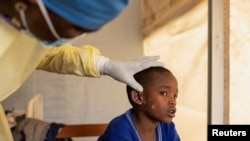ອົງການອະນາໄມໂລກໃນວັນພຸດວານນີ້ໄດ້ປະກາດໂຣກໝາກສຸກລີງ ຫຼື mpox ເປັນພາວະສຸກເສີນທາງດ້ານສາທາລະນະສຸກໂລກເປັນຄັ້ງທີສອງໃນຮອບສອງປີ, ລຸນຫຼັງການລະບາດຂອງການຕິດເຊື້ອໄວຣັສໃນປະເທດ ສາທາລະນະລັດ ປະຊາທິປະໄຕ ຄອງໂກ ທີ່ໄດ້ແຜ່ລາມໄປສູ່ບັນດາປະເທດທີ່ຢູ່ໃກ້ຄຽງ.
ຄະນະກຳມະການພາວະສຸກເສີນໄດ້ປະຊຸມກັນໃນຕອນເຊົ້າວັນພຸດວານນີ້ ເພື່ອແນະນຳຜູ້ອຳນວຍການໃຫຍ່ອົງການອະນາໄມໂລກ ທ່ານ ເທດຣອສ ອາດານອມ ເກເບຣເຢຊຸສ ກ່ຽວກັບວ່າການລະບາດຂອງໂຣກດັ່ງກ່າວວ່າເປັນ “ບັນຫາພາວະສຸກເສີນດ້ານສາທາລະນະສຸກສາກົນຫຼືບໍ່,” ຫຼືເອີ້ນຫຍໍ້ວ່າ PHEIC.
ສະຖານະພາບ PHEIC ແມ່ນການເຕືອນໄພລະດັບສູງສຸດຂອງອົງການອະນາໄມໂລກ ແລະ ແນເປົ້າທີ່ຈະເລັ່ງການຄົ້ນຄວ້າ, ໃຫ້ເງິນທຶນ ແລະ ອອກມາດຕະການສາທາລະນະສຸກສາກົນ ແລະ ການຮ່ວມມືເພື່ອຄວບຄຸມເຊື້ອໂຣກ.
ທ່ານ ເທດຣອສ ໄດ້ກ່າວວ່າ “ມັນມີຄວາມກະຈ່າງແຈ້ງທີ່ວ່າການປະສານງານຕອບໂຕ້ຮ່ວມກັນຂອງສາກົນແມ່ນມີຄວາມສຳຄັນເພື່ອຢຸດການລະບາດພວກນີ້ ແລະ ຊ່ວຍຊີວິດຂອງປະຊາຊົນ.”
ໂຣກໝາກສຸກລີງ ສາມາດແຜ່ລາມຜ່ານການສຳພັດທີ່ໃກ້ຊິດກັນ. ທຳມະດາແລ້ວຈະມີອາການບໍ່ແຮງ, ການເສຍຊີວິດແມ່ນເກີດຂຶ້ນໄດ້ຍາກ. ມັນກໍ່ໃຫ້ມີອາການຄືກັບໄຂ້ຫວັດ ແລະ ບາດແຜທີ່ເຕັມໄປດ້ວຍໜອງໃນຮ່າງກາຍ.
ການລະບາດໃນປະເທດຄອງໂກ ໄດ້ເລີ່ມຂຶ້ນດ້ວຍການແຜ່ລາມຂອງສາຍພັນປະຈຳຖິ່ນທີ່ເອີ້ນວ່າ Clade I ແຕ່ສາຍພັນໃໝ່ Clade Ib ເບິ່ງຄືວ່າຈະແຜ່ກະຈາຍໄດ້ງ່າຍກວ່າຜ່ານການສຳພັດທີ່ໃກ້ຊິດໃນຊີວິດປະຈຳວັນ ລວມເຖິງການມີເພດສຳພັນ. ສາຍພັນດັ່ງກ່າວໄດ້ແຜ່ກະຈາຍຈາກປະເທດຄອງໂກ ໄປປະເທດເພື່ອນບ້ານເຊັ່ນ ບູຣຸນດີ, ເຄັນຢາ, ຣວັນດາ ແລະ ອູການດາ, ເຊິ່ງເຮັດໃຫ້ອົງການອະນາໄມໂລກຕ້ອງດຳເນີນການ.
ທ່ານ ເທດຣອສ ກ່າວວ່າຕື່ມວ່າ “ການກວດພົບ ແລະ ການແຜ່ລາມຢ່າງໄວວາຂອງ mpox ສາຍພັນໃໝ່ໃນພາກຕາເວັນອອກຂອງສາທາລະນະລັດ ປະຊາທິປະໄຕ ຄອງໂກ, ການກວດພົບມັນໃນບັນດາປະເທດທີ່ຢູ່ໃກ້ຄຽງ ທີ່ບໍ່ເຄີຍລາຍງານກ່ຽວກັບ mpox ກ່ອນໜ້ານີ້, ແລະ ຄວາມເປັນໄປໄດ້ຂອງການແຜ່ລາມອອກໄປຕື່ມໃນ ອາຟຣິກາ ແລະ ໄກກວ່ານັ້ນແມ່ນໜ້າເປັນຫ່ວງຫຼາຍ.
ອ່ານຂ່າວນີ້ເປັນພາສາອັງກິດ
The World Health Organization on Wednesday declared mpox a global public health emergency for the second time in two years, following an outbreak of the viral infection in Democratic Republic of Congo that has spread to neighbouring countries.
An emergency committee met earlier on Wednesday to advise WHO Director-General Tedros Adhanom Ghebreyesus on whether the disease outbreak constitutes a "public health emergency of international concern," or PHEIC.
PHEIC status is WHO's highest level of alert and aims to accelerate research, funding and international public health measures and cooperation to contain a disease.
"It's clear that a coordinated international response is essential to stop these outbreaks and save lives," said Tedros.
Mpox can spread through close contact. Usually mild, it is fatal in rare cases. It causes flu-like symptoms and pus-filled lesions on the body.
The outbreak in Congo began with the spread of an endemic strain, known as clade I. But a new variant, clade Ib, appears to spread more easily through routine close contact, including sexual contact. It has spread from Congo to neighbouring countries, including Burundi, Kenya, Rwanda and Uganda, triggering the action from the WHO.
"The detection and rapid spread of a new clade of mpox in eastern DRC, its detection in neighbouring countries that had not previously reported mpox, and the potential for further spread within Africa and beyond is very worrying," Tedros added.





ຟໍຣັມສະແດງຄວາມຄິດເຫັນ